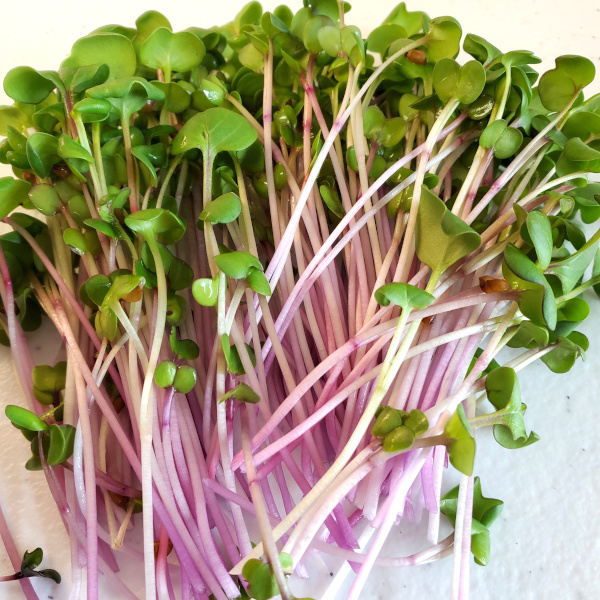Radish

Radish Shoots have a beautiful slender stem that in the variety we grow is pinkish in color and topped with medium green leaves. They have the distinctive spicy flavor of the fully grown radish bulb. Because they are thin shoots, you don’t get a big chunk of overpowering heat the way you do with bulbs. The initial flavor is mild and then after a few seconds the heat kicks in. Like other microgreens, they are delicious with salads, sandwiches, wraps, omelettes, scrambles, smoothies, casseroles, or any other dish. Their fresh, spicy flavor can add just the right amount of zest and heat to all of your favorite meals. They can be eaten raw or tossed into any cooked dish right before serving.
Radish shoots are packed with nutrients which makes them one of the more beneficial microgreens. They are also rich in protein, essential amino acids, chlorophyll, and dietary fiber. Due to their powerful nutritional value, they can support the digestive system, keep blood in control, boost the immune system, promote healthy skin, keep the body hydrated, help with weight management, relieve respiratory disorders, protect the liver and kidneys, and assist in reducing the risk of diabetes, Alzheimer’s, and cancer.
Radish Shoots also contain:
Vitamin A – a powerful anti-oxidant essential for vision and for maintaining healthy mucosa and skin, protects eyes from night blindness and age-related decline of eyesight, may reduce risk of certain cancers, including Hodgkin’s lymphoma, cervical, lung and bladder cancer, plays a vital role in maintaining the body’s natural defenses, including the mucous barriers in the eyes, lungs, gut and genitals which help trap bacteria and other infectious agents, is involved in the production and function of white blood cells, which help capture and clear bacteria and other pathogens from the bloodstream, may reduce incidence of acne, protects bones and reduces risk of fractures, essential for maintaining a healthy reproductive system in both men and women, as well as ensuring the normal growth and development of embryos during pregnancy
Vitamin B complex – eight water-soluble vitamins that perform essential and closely related roles in the body’s cellular function. The vitamins that make up B complex are thiamine (vitamin B1), riboflavin (vitamin B2), niacin (vitamin B3), pantothenic acid (vitamin B5), pyridoxine (vitamin B6), biotin, folic acid, and the cobalamins (vitamin B12). The B vitamins help enzymes in our bodies do their jobs and are important for a wide range of cellular functions, like breaking down carbohydrates and transporting nutrients throughout the body.
Vitamin C – can reduce the risk of infections and pneumonia, help lower the risk of stroke, reduce the risk of developing cancer and cardiovascular disease, reduce macular degeneration that leads to eye disorders, promotes speedier wound healing, reduces asthma symptoms caused by air pollution, aids in the processing of glucose and insulin, and promotes neurotransmitter production which could help to regulate mood
Vitamin E – a fat-soluble anti-oxidant, helps keep the immune system strong against viruses and bacteria, is important in the formation of red blood cells, helps the body use vitamin K and helps widen blood vessels and keep blood from clotting inside them. May be beneficial in the prevention of cancer, heart disease, dementia, liver disease, and stroke
Vitamin K – produces prothrombin, a protein and clotting factor that is important in blood clotting and bone metabolism, supports the maintenance of strong bones, improves bone density and decreases the risk of fractures, has been linked with improved episodic memory in older adults may help keep blood pressure lower by preventing mineral build up in the arteries thus enableing the heart to pump blood freely through the body
Amino Acids – provide cells with enzymes that perform vital processes including tissue repair, building proteins and muscle, regulating immune function, and synthesis of hormones and neurotransmitters
Calcium – mostly stored in bones and teeth, where it supports their structure and hardness. Also aids muscle to movement and helps nerves carry messages between the brain and every body part
Iron – a component of hemoglobin inside the red blood cells that determines the oxygen-carrying capacity of the blood
Magnesium – vital for DNA synthesis and muscle contraction, aids in regulating muscle and nerve function, blood sugar levels, blood pressure, and making protein and bone
Manganese – especially important for brain function and is believed to protect against certain neurological conditions
Phosphorus – important in the formation of bones and teeth, plays an important role in metabolism of carbohydrates and fats and is also needed to make protein for growth, maintenance, and repair of cells and tissues
Potassium – a type of electrolyte, it helps nerves to function and muscles to contract and helps regulate heartbeat.
Zinc – helps the immune system fight off invading bacteria and viruses and helps make proteins and DNA. It is an important nutrient for reproductive health in both males and females and is required for proper growth and delvelopment of children and infants.

